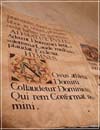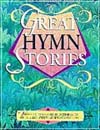

|
|


|
 |

I Heard the Voice of Jesus Say
Matthew 11:28
PROSPECT | Hymn History | Bible Passage
|
Author: |  |
Horatius Bonar, 1808-1889 |
|
Musician: | |
Old English Melody |
I heard the voice of Jesus say,
"Come unto Me and rest;
Lay down, thou weary one,
lay down Thy head upon My breast!"
I came to Jesus as I was,
Weary and worn and sad;
I found in Him a resting place,
And He has made me glad.
I heard the voice of Jesus say,
"Behold, I freely give
The living water— thirsty one,
Stoop down, and drink, and live!"
I came to Jesus, and I drank
Of that life-giving stream:
My thirst was quenched, my soul revived,
And now I live in Him.
I heard the voice of Jesus say,
"I am this dark world's Light;
Look unto Me, thy morn shall rise,
And all thy day be bright!"
I looked to Jesus, and I found
In Him my Star, my Sun;
And in that Light of life I'll walk
Till trav'ling days are done.
|


|
 |
HYMN HISTORY:
This hymn has been referred to as one of the most ingenious in the English language. Each stanza divides equally between invitation and response.
For example, the first verse begins with the picture of a weary soul in search of rest from the burden of sin; but concludes with the heart's glad response to the Saviour's invitation to 'Come unto me.' A similar pattern is seen running through the remaining verses.
The author, Dr. Horatius Bonar, was born in Edinburgh, Scotland, on December 19th, 1808. After his early education and ministerial studies he was ordained to the ministry of the Church of Scotland, then established, in 1837.
However, when the fateful 'disruption' took place in 1843, Bonar was one of those who separated from the established church and helped to found the Church of Scotland 'free,' or the Free Church' as it later came to be called.
In that same year he married Miss Jane Lundie and moved to a pastorate in Kelso, on the River Tweed, in the Scottish borders.
Their 40 years together were not without trouble and sorrow, yet they could testify that all the things that happened to them brought glory to God and gave them a wider ministry. When five of their children died early in life, Horatius wrote, 'Spare not the stroke; do with me as thou wilt; let there be naught unfinished, broken or marred, complete thy purpose that we may become thy perfect image.' Surely, the sign of true godliness.
It is reported that Dr. Bonar spent many hours each day in his study, praying aloud. A maid, who was converted in his home through these prayers, commented 'If he needs to pray so much, what will happen of me if I don't pray?'
Once when speaking to a young man about the matter of his salvation, he discovered that this individual had great difficulty in believing that the Lord could, and would save him from his sin.
Dr. Bonar asked 'Which is of greater weight your sin, or the blood of Jesus shed for sinners?' Joyfully the young man answered 'I am sure the blood of Jesus weighs more heavily than even my sin.' Thus by the holy wisdom and devoted skill of the man of God he was brought to saving faith in Christ. Dr. Bonar firmly believed that the only antidote to crimson sin is the cleansing blood of the Lord Jesus.
He was a prolific writer, editing two magazines, publishing many articles and producing hundreds of tracts. One of these, entitled "Believe and live", and said to be a favourite of Queen Victoria, sold a million copies. He also wrote 600 hymns and translated at least 60 Psalms.
Bonar was a man with a powerful and consecrated intellect, a deep knowledge of the Scriptures, and a physical stature both tall and strong. But these somewhat overpowering characteristics were offset by a gentle, sympathetic nature and a childlike faith.
Perhaps it was the childlikeness which gave him such a love for little ones. Certainly it was his love and concern for the young that led him to the writing of his hymns.
When he observed their rather indifferent spirit towards the traditional singing of the Psalms; but a much livelier attitude when singing their weekday songs, he decided to write sacred words for their joyful tunes.
The experiment met with instant success and brought excellent results too. One woman who had attended his weekly Bible class later testified, 'We still cherish the hymn he wrote specially for us.' It ran;
Shall this life of mine be wasted,
Shall this vineyard lie untilled?
Then no longer idly dreaming,
Shall I fling my years away;
But, each precious hour redeeming,
Wait for the eternal day.
In 1866 Horatius Bonar moved to Edinburgh, the city of his birth. There he continued his faithful labours for the Master until his death on July 31st, 1889. A sad loss to Scotland, its church and its people, but a life lived to the service of others and the glory of God.
I heard the voice of Jesus say,
'Come unto me and rest;
Lay down, thou weary one, lay down
Thy head upon my breast.'
I came to Jesus as I was
Weary, and worn, and sad;
I found in him a resting place,
And he has made me glad.
BIBLE PASSAGE:
28 Come unto me, all ye that labour and are heavy laden, and I will give you rest.
|
|
|

|

|